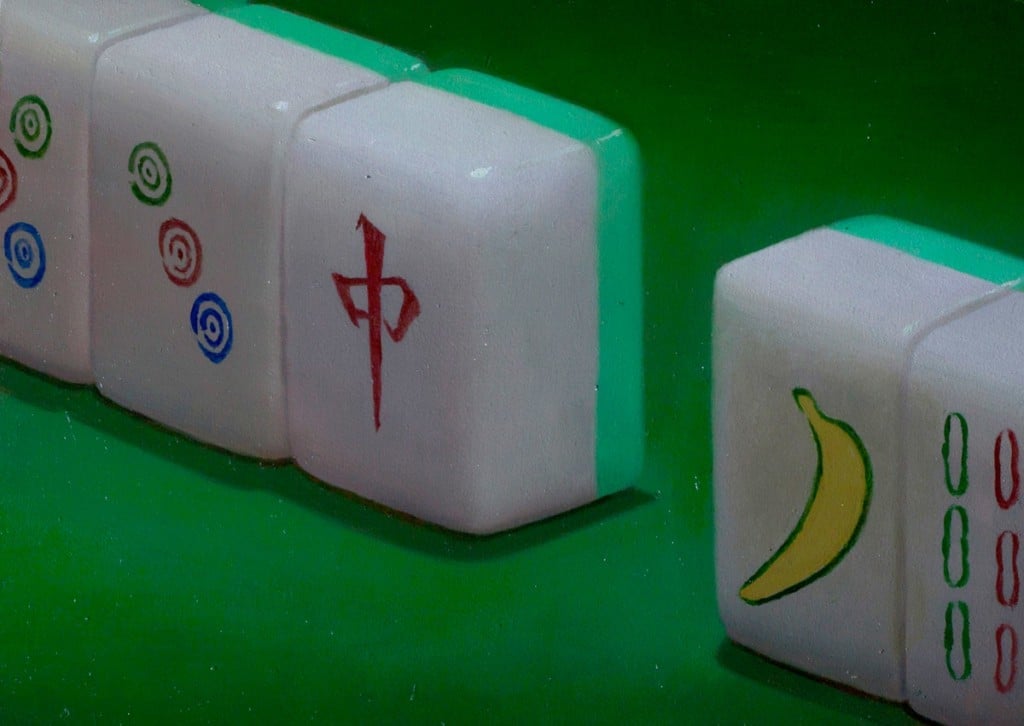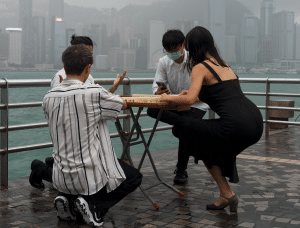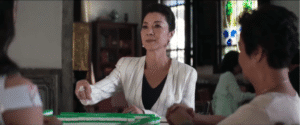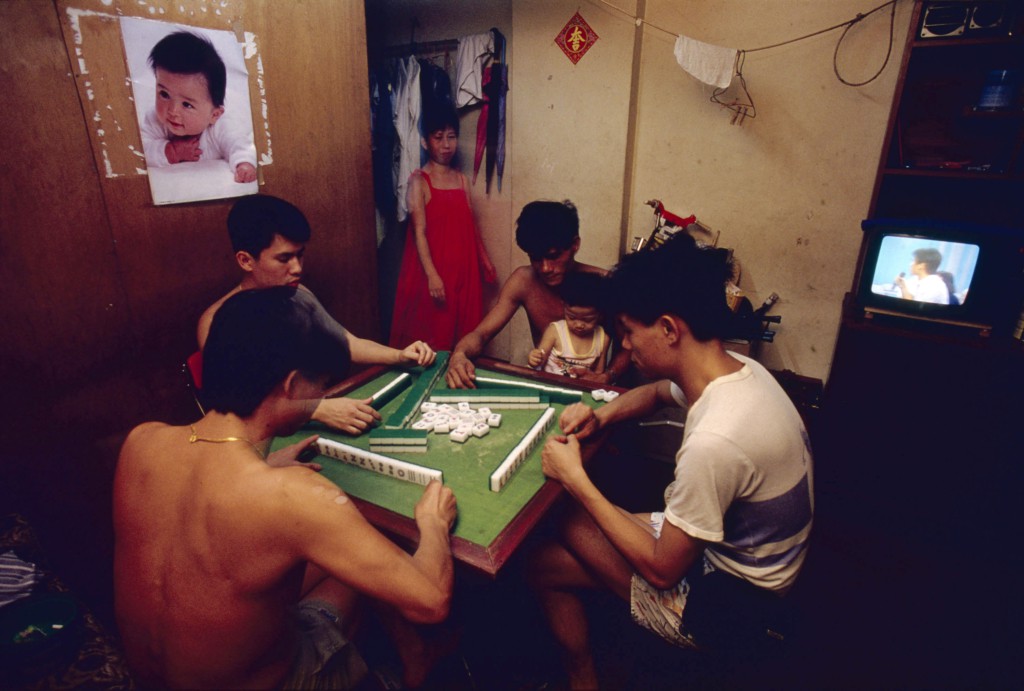Mahjong, A Family Affair
Unless you live in the outlying islands or in typhoon prone hotspots, when you hear that typhoon signal no.8 will be hoisted soon, your first thought might be to imagine yourself sitting down at a mahjong table with your friends and family.
Mahjong is deeply rooted in Hong Kong culture: a game loved by people of all classes, whether they are crazy rich or dirt poor. Mahjong is being played at any given opportunity and occasion, even at a wedding banquet – by far the most common yet the most incongruous activity to be doing whilst celebrating a wedding!

In between Identities, Peter Chan
Some legends hold that Mahjong was invented by the ancient Chinese philosopher Confucius. Historical evidence, on the other hand, shows that the game evolved from similar card games in the late 19th century, eventually trickling to its Asian neighbours and the world. Translated roughly as “the game of sparrows”, because it is said that the clacking of tiles during shuffling resembles the chattering of sparrows, mahjong is a combination of skill, strategy and luck, and the popularity of the tile-based game led to dozens of variations in Asia.
The game is played with a set of hundred forty-four tiles based on Chinese characters and symbols, although some regional variations may omit some tiles or add unique ones. In most variations, each player begins by receiving thirteen tiles. In turn, players draw and discard tiles until they complete a legal hand using the fourteenth drawn tile to form four melds (or sets) and a pair (eye). In Hong Kong, the majority plays the Cantonese Mahjong. All variations virtually have the same suits with Coins 筒, Bamboos 索, Thousands 萬, Winds 風 and Dragons 中發白. Rather than getting into the specifics of how to win a mahjong game (bear in mind who you play with!), we will reflect upon the mahjong culture as an inherent component of the local traditions and habits.

Photographer Alvis Chui and friends playing mahjong during typhoon Kompasu, 2021
Li Ka Shing’s “Li’s Force Field”
Should a typhoon no.8 approach and linger around Hong Kong for the night, this usually means that mahjong houses or friends with mahjong tables at home will be fully occupied because work will not resume the next day – even the stock market closes for the day if the typhoon is persistent throughout the night.
Although there is no exact figure to quantify the proportion of the city’s population employed by tycoon “Superman” Mr. Li, people have created this legend about “Li’s force field” which can deflect typhoons from hitting Hong Kong on important business days so that the stock market is not affected! So with such rarity for Hongkongers to gather for an all-nighter mahjong game (“enough feet” in Cantonese means that there are four people to start a mahjong game), they are “trained” to return to work in less than two hours when typhoon signal is lowered down to signal no.3 the following morning.

Extract from the movie “Crazy Rich Asians” with Michelle Yeoh
Mahjong culture in movies
When visiting friends and relatives during Chinese New Year, the TV is always looping old classic festive movies, and watching the likes of All’s Well, Ends Well (1992), Fat Choi Spirit (2002) and Kung Fu Mahjong (2005) has subtly become a festive tradition. As repetitive as it may sound, people never seem to get bored watching the same stories because as their mahjong skills improve, they begin to understand more of the films. The other tradition is to guide the younger cousins to watch the movies as well, and so the annual habit can perpetuate that way.
Mahjong, a family affair
Hong Kong being one of the most densely populated cities in the world, when a mahjong game is in progress in a small estate housing, the game will be the centre of everything happening in the house. The mealtimes, conversations or even late school pick up will be governed by that very mahjong table. Children growing up in government housing estates were able to live their life while their parents were playing mahjong with friends and neighbours any time of the day. They would do their homework or sleep with the background sounds and clicking of adults playing mahjong and they would eventually learn the skills from their parents before adopting the same lifestyle.

Photo Greg Girard, 1989
If you’re not playing mahjong yourself in a day, one of your neighbours might be, and there is no getting away from that periodic sound of mahjong tiles clicking against one another and eventually that shuffling noise.
Also, if you need more excuse to dress up your mahjong table, studies have shown that playing mahjong, like chess and bridge, can help elderly people preventing or at least slowing down the development of Alzheimer’s disease because the game is constantly requiring high cognitive functions. Another justification for playing when they’re being told they should take a stroll in the park instead!
Lastly, there are unwritten rules when playing with your grandparents or your in-laws. In Cantonese, this is called “loosening the tile” to your respected elderly or your potential parents-in-law: letting them win when you knowingly have the tile that could make you win. Not winning the game could help you winning a place in the family and to be in the good books of your in-laws. You could even get the drumstick from the whole chicken dish at dinner as a sign of welcome to this family!
These are the unseen local culture behind closed doors in every household and very often family affairs are dealt over a mahjong table.